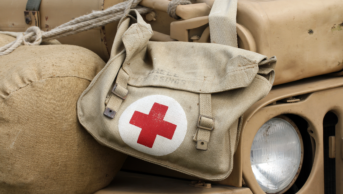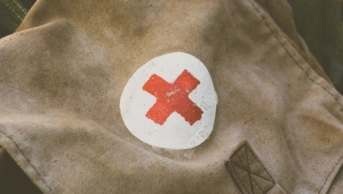
Courtesy of Helena Pickin
Helena Pickin is deputy chief pharmacist and National Institute of Health and Care Excellence (NICE) medicines and prescribing associate at Defence Medical Services (DMS) Whittington, Ministry of Defence (MoD).
What was your first contact with the pharmacy profession?
From the age of 14 years, I worked as an evening assistant for Lloyds Chemist (now LloydsPharmacy). At the time, I was planning on studying medicine but got chatting with the pharmacist manager about pharmacy and being a pharmacist. Given the fact that I can be a bit squeamish, it sounded like a great alternative to medicine, but provided the clinical engagement that I was looking for.
I wanted to join the Royal Air Force as a pharmacist but sadly, only the Army commissioned pharmacists and for some reason, I had never considered this an option.
What is your current role and how did you get there?
Having qualified as a community pharmacist, I quickly realised that community pharmacy wasn’t for me. I immediately started studying part time for my clinical diploma, with the aim of becoming a primary care pharmacist. Through a colleague, I was offered the opportunity to work part time in a GP surgery, which was just the beginning. I steadily transitioned from being a practice-based pharmacist, running anticoagulation and medication review clinics to becoming a prescribing advisor within primary care trusts in Birmingham. After spending 12 years working for the NHS, I decided I needed a new challenge. Around this time, an opportunity to become the prescribing management pharmacist for DMS headquarters in Whittington was put to me. This was a new role for the MoD, and would allow me to use my knowledge and expertise to develop the job in my own way.
The prescribing management pharmacist role itself is similar to NHS prescribing advisor roles, but with the added nuances of operating in a military environment. I knew that it would be a steep learning curve, because of the new terminology and ways of working — but I couldn’t wait to start!
Since joining DMS Whittington five years ago, I have been promoted to deputy chief pharmacist, becoming the head of the civilian pharmacy cadre.
What are your day-to-day responsibilities?
Working alongside a senior military pharmacist and a civilian pharmacy technician, I provide strategic leadership, direction and education on matters relating to medicines optimisation across defence medical services, to ensure high-quality, cost-effective prescribing in the UK and overseas, in peacetime and on operations. I also lead the development and implementation of DMS-wide strategies and medicines-related education, audit and negotiating and setting priorities with other defence healthcare departments.
My role involves developing prescribing policy and educational programmes for defence medical services healthcare professionals
A key part of my role involves developing prescribing guidance based on national guidelines, policies and other resources (e.g. NICE); the review and maintenance of defence prescribing formularies, providing regular feedback to clinicians on prescribing performance, developing prescribing policy and educational programmes for DMS healthcare professionals and liaising with external agencies such as NHS England, Her Majesty’s Revenue and Customs and NICE on issues relating to medicines.
I am the NICE medicines and prescribing associate for the MoD, responsible for the implementation of NICE guidance across the organisation, in conjunction with the medical director and defence consultant advisors. I also provide governance and assurance support to our tertiary care facility, the Defence Medical Rehabilitation Centre — Headley Court, ensuring that a high-quality medicines optimisation service is provided.
How does your role differ from military pharmacists working for the MoD?
As a civilian pharmacist, I do not have to wear a uniform, nor am I expected to be on call or to deploy. Neither am I subject to the two to three-year postings that my military counterparts have to endure.
The regular movement of military staff around the organisation frequently delays progress
Apart from that, and depending on the department, the roles of military and civilian pharmacists are similar – we are all registered pharmacists and follow the standards laid down by the General Pharmaceutical Council. Civilian pharmacists are employed on NHS Agenda for Change (AfC) terms and conditions, so they can transfer pensions, holiday entitlement and achieve increments each year, depending on performance. Other benefits can include joining the officers’ mess, allowing attendance at military dinners and events occurring throughout the year.
Which aspects of your work do you find most rewarding?
Discovering that my advice has been implemented and has benefited patient care is most rewarding. Although I work in a headquarters, it is reassuring to know that practitioners feel comfortable enough to contact me directly for advice and support on medicines optimisation issues, and frequently do so.
I have been fortunate to visit some of our overseas bases, such as British Forces Cyprus, as part of governance and assurance reviews, and have been able to participate in medical planning exercises for future military operations.
What is the most challenging part of your current role?
Compared with the NHS, the MoD has been a little behind the curve from a medicines optimisation perspective and implementing changes can be slow. The regular movement of military staff around the organisation frequently delays progress, as it can take a while to bring new military staff up to speed or posts are sometimes left vacant. That said, I think we have made significant improvements over the last five years and the fruits of our labours are finally being demonstrated. The pharmacy cadre, both military and civilian, continues to be an integral part of DMS.
What advice would you offer someone hoping to pursue a career as a MoD pharmacist?
The majority of our pharmacists are AfC band 8a or above so, like the NHS, anyone applying for a job with the MoD would be expected to have a postgraduate diploma or higher degree in clinical pharmacy or subject related to medicines management. Most roles are based within a primary care environment, so relevant experience would be beneficial as it can be a steep learning curve for someone coming from a community pharmacy background, especially when you add in the need to get your head round the military nuances and acronyms! There is the possibility of being able to visit overseas bases as part of governance and assurance reviews and some opportunity for promotion. Most vacancies are advertised on the Civil Service jobs website.
What is your ultimate career goal?
In the future, I hope to become the most senior civilian pharmacist within the MoD. I also have a passion for coaching and mentoring and over the last few years I have achieved a level 7 qualification in executive coaching and mentoring from the Institute of Leadership and Management and have become a neurolinguistic programming practitioner. While I use these valuable skills in my current role in the MoD, I would love to provide them on a personal basis outside of the workplace and support other professionals to achieve their goals.


